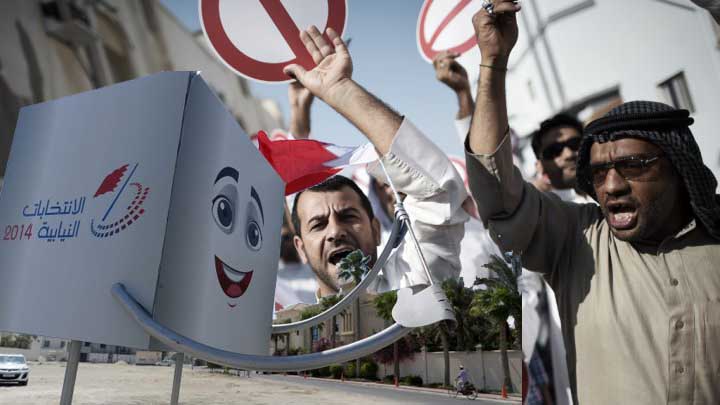Alwaght-Bahrainis voted on Saturday in the first parliamentary elections since 2011 when anti-regime protesters took to the streets demanding democracy. Shi'ites as the majority of the Bahrain have boycotted vote. According to Reuters, the elections were boycotted by the Shi'ites over accusations that constituency changes represented by the ruling family.
Bahrain witnessed massive demonstration aimed at constitutional reform and removal of Prime Minister Sheikh Khalifa, in February 2011. Despite arrests and beatings from ruling regime since then, ranks of the oppositions are broadened and calls for reforming constitutional law. In addition, removing Prime Minister became call for fall of Al Khalifa regime.
Opposition in Bahrain is divided into two groups; one group seeks to overthrow the Al Khalifa regime and another group supports political reform and formation of a constitutional government. AL Wefaq party which is led by Sheikh Isa Qassim is the main supporter of the reform movement. AL Wefaq has a strong political infrastructure and given its social and political history and is capable of shaping huge gathering of about 300 thousands. This movement has always declared that they are after a political reforms not overthrow of the government and along with some other parties signed an agreement, known as Manama Document, in which they insist on formation of a constitutional ruling, removal of Prime Minister and formation of an a democratically elected government. Another movement, contrary to former one, believes that the government is neither legal nor reformable so it resorts to violence against security forces. This movement calls for formation of a political system based on republic norms.
Considering this condition, Al Khalifa took two strategies facing revolutionaries' requests. After unrest in February and March 2011, the Al Khalifa, by the centrality of Al Wefaq and Prince Crown tried to pursue a political and peaceful resolution. But from the very beginning, it was predictable that this conflicts that are rooted in past years are not solvable within a few weeks and will only lead to emergence of a security- oriented view in the society. This security- oriented attitude which is supported by Prime Minister overwhelmed Crown Prince's attitude that backs political solution. Regarding the Bahraini people's widespread protests which has attracted the attention of regional and international organizations, Al Khalifa, deprived of supports' of America and its other allies tried to make a security case out of Bahraini people's ordinary and political demonstration. Afterwards, the more widespread became the overthrow movement the more successful became the Al Khalifa regime to make a security environment in the country. Al Khalifa, by the help of its agents intensified this situation in order to ban the demonstration in the country and suppress the Shiite protests and put them under the worst social and political pressures.
However, many analysts believe that the security approach of Al Khalifa is temporary and they cannot continue it for a long time and will be made to negotiate with protesters. Appointment of as the First Deputy Prime Minister who has more conciliatory approach towards opposition party confirms analysts' prediction. However, in order to achieve this goal, strategies of reformists and supporters of overthrow movement should become closer to one another and Sunni and Shiite sectarian slogans should be put aside. In addition, the world-wide supports for Bahraini apposition and its legitimate demands, specially the world of Islam support, will be effective to achieve the ultimate goal.
Bahrain has been shaken by unrest since the February 2011 demonstrations. The Bahraini people have long complained of political and economic problems and shortcomings, a charge the government denies, but it is a painful flagrant reality based on the evidences and documents. The election is unlikely to resolve the problems that have gripped the country. The Shi'ites maintains that the new parliament will not have enough power. Reconciliation talks between the royal family and the Shiites as the majority revived early this year, but appeared to stall after the prosecution of Shiite officials on a variety of accusations.
Al Wefaq, the main opposition in Bahrain, is boycotting the elections along with other groups. In a statement, they said the way voting districts were reorganized "divides society according to sectarian and racial lines". Due to the boycott, polling stations were silent in the most of this country ruled by the regime. Bahrain's Justice Ministry claimed turnout for parliamentary elections was 51.5 percent while, Al Wefaq declared that it was less than 30 percent, Alwaght reported, No date for the results has been announced yet.



























